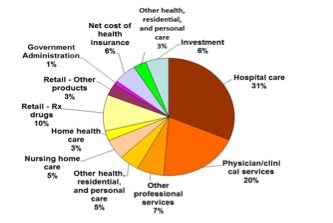
We live in a world where people spend more than 700 billion minutes per month on Facebook, perform more than 800 million daily searches on Twitter, and upload 60 hours-worth of video to YouTube per minute. We are all by-products of a global, interconnected society that has become more or less dependent on mobile apps, social networking, and online information to make our lives more convenient and easier to share. Yet, when you look at the important issues affecting the world and our communities, how can new technologies benefit our society in more sustainable, long-term ways?
Take a look at our healthcare system. Health spending is at an all-time high (nearing $2.6 trillion in 2010), government officials and health experts are up in arms over ever-present budget cut proposals, and many Americans are in tight financial straits in the face of rising premiums and exorbitant doctor and hospital bills. For the typical consumer, healthcare is an impersonal, time consuming and highly confusing puzzle. To change the way healthcare works, we must change the way we, as consumers, interact with our health, and health organizations must get people invested in their health by making health management simple, personal and rewarding. The key to bridging the gap lies in technology.
By applying similar forms of technology we've welcomed into our lives by way of Facebook and Google -- namely, social networking, personalization technology and game mechanics -- to healthcare, we can enable care providers and patients alike to do what is most needed: communicate and engage. The convergence of healthcare and innovative, consumer-oriented technology (known as "health 2.0") allows for a shift from reactive, crisis management and acute-oriented care to preventive and anticipatory care, and offers a faster, more personalized and user-friendly solution to an expensive and confusing healthcare system.
This is particularly true when it comes to managing and living with a chronic condition, like autism. Given that autism is the fastest-growing developmental disability in the U.S., it would be foolish to overlook the many ways innovative health 2.0 technologies can help improve the day-to-day lives of all those affected by the disorder, and particularly an underserved group within the community -- caregivers.
The cost of providing care for a person with autism affected by intellectual disability through his or her life span is $2.3 million; however, no dollar amount can measure the level of commitment and unlimited amounts of emotional support and time that is given. The caregiver's own mental and physical well-being is often neglected, but these individuals need their strength to provide loved ones with the support they need -- which is where new digital health technologies come in.
For autism caregivers, today's digital health platforms can offer the personalized tools, resources, and support they need to live healthier lives and, in turn, better care for those who depend on them. For one, these tools provide a customized community, in the form of an anonymous, secure (HIPAA-compliant) environment online to interact with others in similar situations as well as with medical professionals -- for everything from sharing difficulties, concerns and successes, to posing questions and tapping a network of trusted individuals for advice. While there are support networks out there, it's the anonymity, security and "all-under-one-roof" nature these health 2.0 platforms offer that make them so useful.
Using recommendation engines, these platforms also offer personalized news and resource aggregation, sifting through thousands of vetted sources and presenting caregivers with health articles and videos that are relevant for them based on their particular interests and concerns -- an invaluable tool for caregivers strapped for time. In addition, online goal and health data tracking tools allow caregivers to set and track various health goals for themselves, friends and family. Users can import data from health and fitness devices or manually enter details about their diet, exercise routines and other health stats, which can be integrated into visual, time-stamped graphs -- making it easy to track their health and the health of those they care for.
Finally, by bringing in elements of gaming mechanics so users can collect coins, gems, medals and badges for making healthy choices, connecting with others and sharing their experiences, digital platforms that use positive feedback and rewards to reinforce behaviors help caregivers stick to healthy lifestyle choices.
What caregivers really need are personalized information, a secure and anonymous place to interact with others in the same boat, and an easier way to engage with and manage their health. New digital health tools that apply proven consumer engagement technologies to health management provide just that, and are the way forward when it comes to driving healthier behaviors, one engagement at a time.

How the U.S. Healthcare Dollar is Spent
Source: Martin A.B. et al., "Growth In US Health Spending Remained Slow in 2010; Health Share of Gross Domestic Product Was Unchanged from 2009," Health Affairs, 2012.
Audax Health and Autism Speaks have partnered to provide community, tools, and resources to those affected by autism within Audax Health's free digital health platform, Careverge, and recently launched a campaign, Advocates Need Their Strength, to help caregivers stay strong and better care for those who depend on them. To learn more about the campaign, please visit http://www.careverge.com/healthyadvocates. As part of Audax Health's commitment to supporting the autism community, the company donated $1 for every Careverge registration for the duration of the campaign.